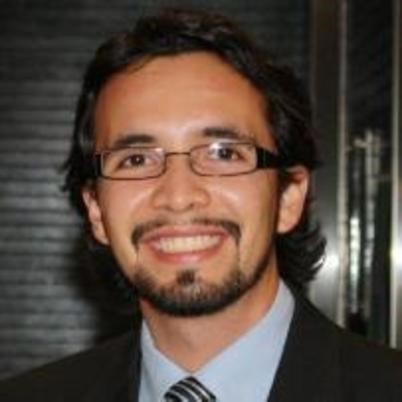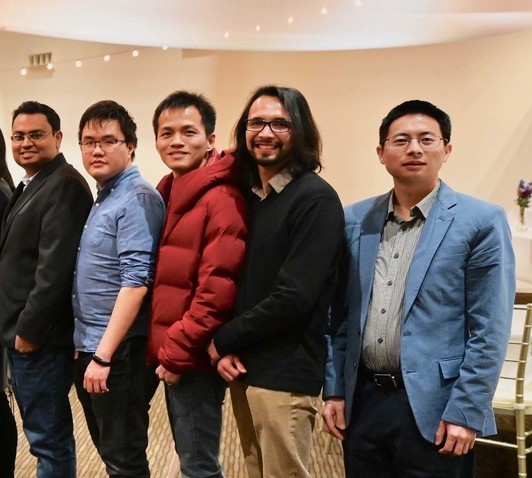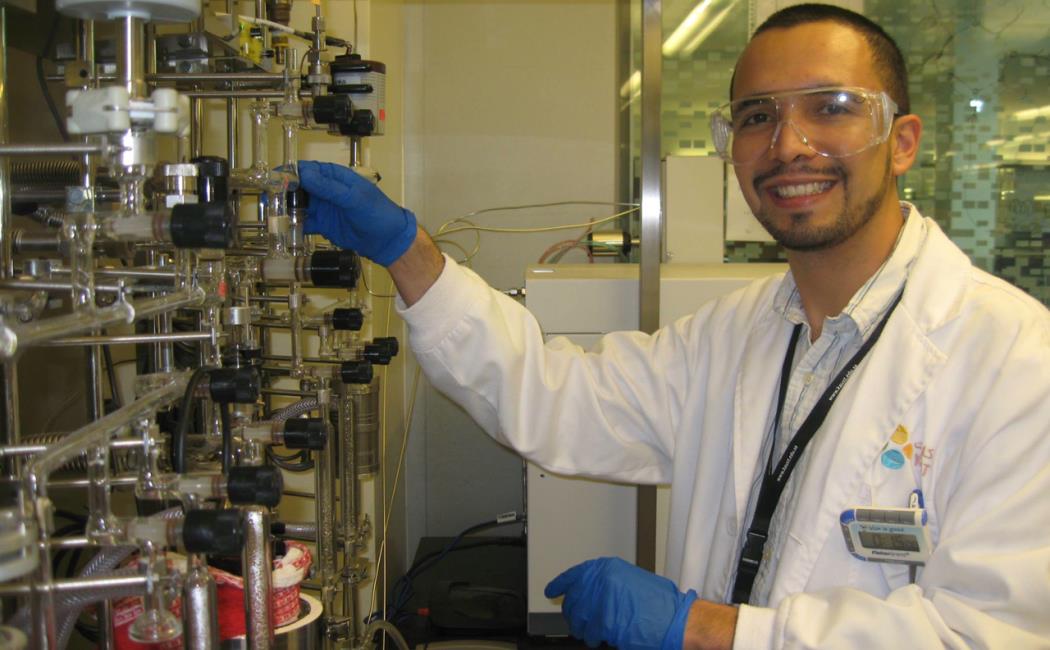Angel Garcia-Esparza (PhD ’16, MS ’11)
by Melissa Pappas (MS ’17)
"As I continue to pursue my research both in artificial photosynthesis and next-generation atomically-thin catalytic materials, I am always faced with challenges that take me out of my comfort zone. Fortunately, KAUST formed the basis of my adaptability and taught me to take risks and push myself. Now, in this pandemic, I am even more grateful for my ability to adapt. KAUST provided the environment for me to recognize challenges as opportunities, and also to know the reward of research and pushing the boundaries of science.”
Born and raised in Torreón Mexico, Angel Garcia-Esparza was asked many times by his friends and family why he would want to live in Saudi Arabia for graduate school. Although it was not the first place he thought of when looking for graduate opportunities, his first visit convinced him he was in the right place.
“It felt like an adventure. When I first visited KAUST it was still under construction, but I was immediately impressed with the level of investment and the Professors involved in the project,” says Garcia-Esparza, who quickly returned to enrol as a MS student and later finished his PhD degree as well.
“During our first weeks as students we stayed in a hotel in Jeddah. It was actually a really fun time because it made us [the students] super close and we formed a strong community of friends very quickly. Classmates from Saudi invited us to their houses to meet their families, and we got to see more of the country’s culture before starting classes. Once we got to KAUST we would always hang out at Discovery Square to socialize and to build our founding class community,” says Garcia-Esparza.
Before starting classes at KAUST, he had completed his bachelors in Mechatronics Engineering, but at that time KAUST offered a six-month study abroad program at University of Manchester, UK where he could explore whatever he wanted.
“I planned to enrol in the Mechanical Engineering MS program, but after my stay in Manchester that KAUST arranged, I found a stronger interest in sustainable development and renewable energy. KAUST is always very supportive and flexible to help students pursue their true passions, and thus I did a MS in Environmental Engineering and then a PhD in Chemical Science under the supervision of Professor. Kazuhiro Takanabe at the KAUST Catalysis Center [KCC],” says Garcia-Esparza.
Exposure to Global Professional Networks
In addition to finding the support and encouragement for pursuing his unique research interests, Angel took advantage of the diversity of academics on campus.
“The interdisciplinary research centers at KAUST meant that students could learn from experts in many different fields and find support from different professors. Knowing professors in other fields helped me open my perspective on what kinds of questions I could ask and actually aim to answer in my thesis,” says Garcia-Esparza.

Angel conducted research on artificial photosynthesis, or photocatalytic water splitting, for both his MS and PhD work. While pursuing his degrees, he balanced work with new interests that arose during the Enrichment Programs.
“WEP was my favorite time of the year. I remember taking a comic book drawing course, jazz guitar course, and a djembe drum playing course. I still love those activities and am very grateful that WEP introduced me to some of my favorite hobbies.”
“WEP actually had a major impact on my career path. I first heard about artificial photosynthesis from Professor Andy Huang at KCC, and I was completely intrigued and captivated. Then, there was a great WEP speaker, Dr. Eric Puzenat, who was doing research on photocatalytic hydrogen generation from water splitting. I spoke to him after the lecture and he invited me to work with him as an intern at IRCELYON in Lyon, France. This research internship in photocatalysis later opened the doors for me to work in Professor Takanabe’s photocatalysis group at KCC,” says Garcia-Esparza.
After reflecting on this year’s WEP theme “Connectivity”, Garcia-Esparza realized that without WEP and KAUST he would never have made the connections to people and universities that impacted the path he took to his current position.
“KAUST actually connected me to many important people now that I think about it. Another event that helped bring me to where I am today was a conference organized by our photocatalysis group at KCC. We invited experts from all over the world, and we were able to make many diverse connections. Professor Tangui Le Bahers, one of the professors that came to the conference, is an expert in theoretical chemistry from one of France’s top research institutions ENS de Lyon. During a coffee break from the lab tour, we discussed my experimental and theoretical work, and he offered me the opportunity to work with him. He said that we would make a great team collaborating on multiscale simulations for artificial photosynthesis. After KAUST, I worked with him for my first postdoc in Lyon, France,” says Garcia-Esparza. “I was back to the beautiful city that started my passion in photocatalysis, thanks to WEP.”
After graduating with his PhD in 2016, Garcia-Esparza moved to France to start his new position, and after some time, he was ready to call Lyon his home. He was then contacted by another connection he made at KAUST.
International Career Opportunities
“In 2015, while I was working on my PhD thesis at KAUST, I did a research internship at Stanford Synchrotron Radiation Lightsource [SSRL] at SLAC National Accelerator Laboratory operated by Stanford University. During my internship at SSRL, I worked with Dr. Dimosthenis Sokaras and other SLAC scientists at the synchrotron and we published our work after completing my thesis. I truly believed I would stay in France, but one day I received an email from the very same SSRL research team that I interned with asking if I would be interested in a position as a postdoc in their lab.”

Garcia-Esparza made the decision to move to California to pursue the next step in his research career while also being closer to his family in Mexico.
“I worked as a postdoc on a collaborative project between Dr Sokaras at SSRL-SLAC and Professor Zheng in the Department of Mechanical Engineering at Stanford. I have been working in one of the best synchrotron beam lines in the world. My research here focuses on the operando characterization of atomically precise catalytic materials for energy conversion using advanced X-ray spectroscopy. I was recently promoted to Research Associate in 2020 and have been enjoying my work here the entire time,” says Garcia-Esparza.
Garcia-Esparza credits KAUST for his many connections and both the research and life lessons he learned, which have been essential this past year.
“As I continue to pursue my research both in artificial photosynthesis and next-generation atomically-thin catalytic materials, I am always faced with challenges that take me out of my comfort zone. Fortunately, KAUST formed the basis of my adaptability and taught me to take risks and push myself.
Giving Back to KAUST
Now, in this pandemic, I am even more grateful for my ability to adapt. KAUST provided the environment for me to recognize challenges as opportunities, and also to know the reward of research and pushing the boundaries of science.”
Angel Garcia-Esparza recently spoke during the WEP 2021 Alumni Lecture Series, with the theme “Connectivity”. His presentation shared details from his research using the synchrotron, and his work on the characterization of samples down to the atomic level; this is foundational research for the production and development of atomically thin materials. Applications of his research include the advancing of materials such as flexible electronics, next generation 2D devices, and pushing the physical dimension limitations of microelectronics. He also continues his work on artificial photosynthesis.
Although Garcia-Esparza lives in California, he continues to stay in touch with his classmates from KAUST’s founding class, who have also spread across the globe. He and his wife were guests at the most recent (pre-Covid) alumni dinner in Palo Alto, hosted by KAUST’s President Tony Chan and Alumni Affairs in February 2020.





Leave a Reply
Your email address will not be published. Required fields are marked *